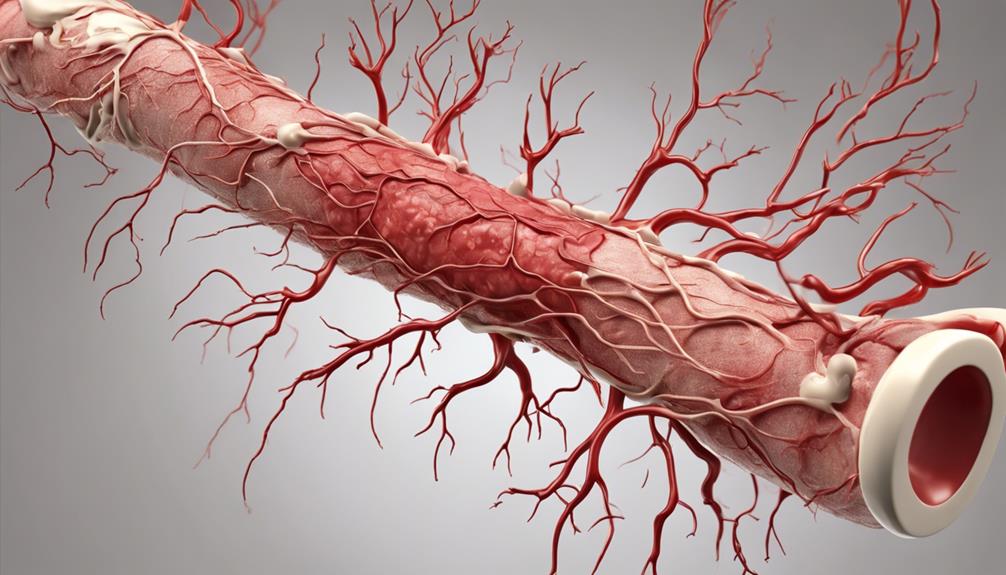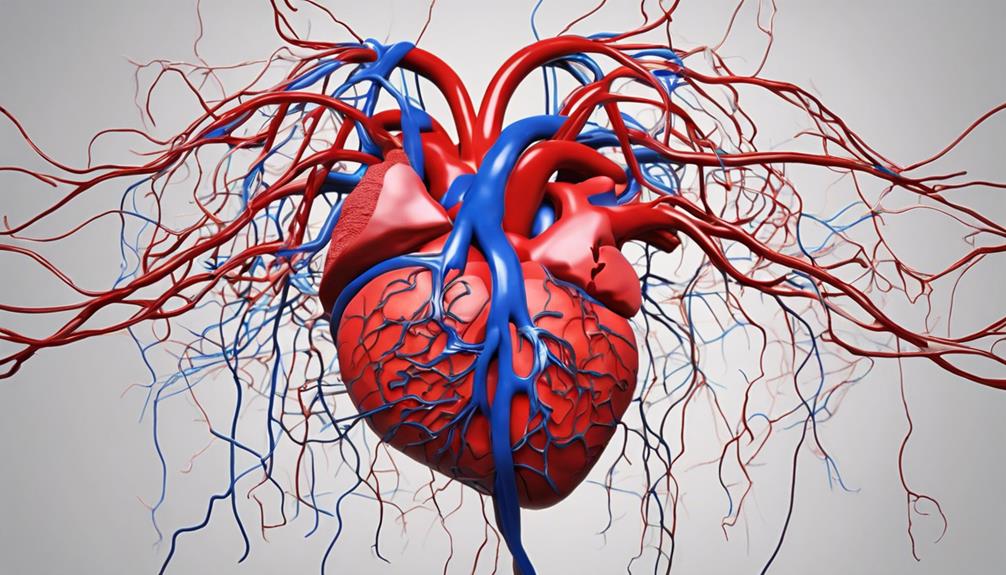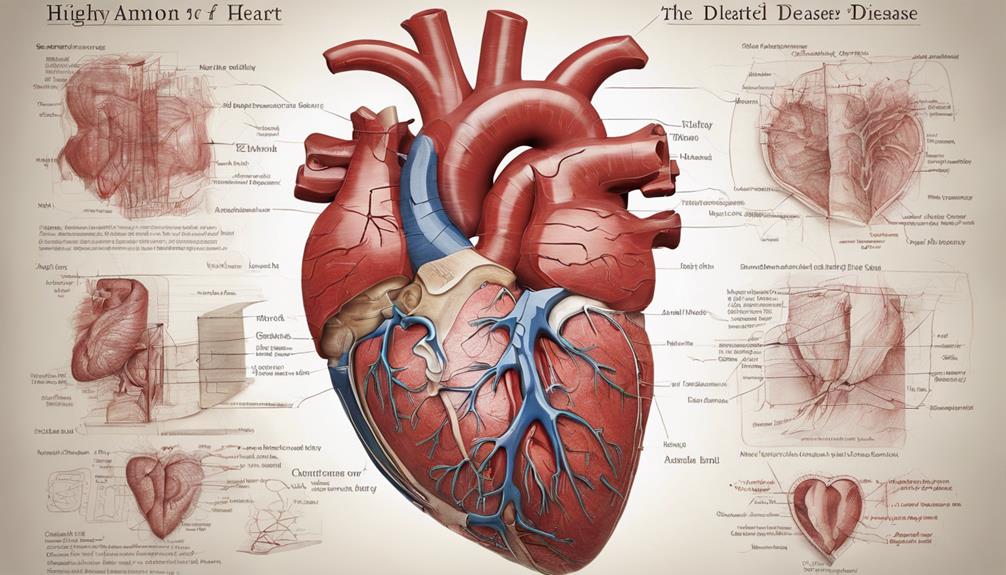Delving into the expansive realm of heart health, **hypertension** stands out as a powerful adversary among cardiovascular diseases. This stealthy opponent silently targets our arteries, paving the way for a series of detrimental consequences. Learn more about this silent danger and the importance of tackling it proactively.
But how exactly does this unseen adversary pave the path to cardiac peril? Let's navigate through the labyrinth of interconnected mechanisms that make hypertension a key player in the realm of cardiovascular risk.
Key Takeaways
- Damages arterial walls and promotes atherosclerosis development
- Increases risk of heart attacks by reducing blood flow
- Elevates stroke risk significantly due to vessel damage
- Prevention and treatment crucial for reducing cardiovascular risks
Impact on Heart and Blood Vessels
Hypertension adversely affects the heart and blood vessels by damaging arterial walls, increasing the risk of atherosclerosis and heart disease. Elevated blood pressure from hypertension places undue strain on the heart, causing the blood vessels to narrow and harden. This constriction impedes the smooth flow of blood to the heart muscle, heightening the probability of cardiovascular complications.
The continuous pressure exerted by hypertension forces the heart to labor intensively, leading to the thickening of the heart muscle and the potential onset of heart failure. Moreover, hypertension plays a pivotal role in the development of plaque within blood vessels, escalating the likelihood of heart attacks and strokes.
Unchecked hypertension can inflict enduring harm on both the heart and blood vessels, profoundly impacting overall cardiovascular health. Understanding the intricate interplay between hypertension and its detrimental effects on the heart and blood vessels is crucial in mitigating the risks associated with heart disease and atherosclerosis.
Development of Atherosclerosis

The development of atherosclerosis is a critical process in understanding the progression of heart disease, characterized by the gradual buildup of plaque within the arteries. Hypertension plays a significant role in accelerating the advancement of atherosclerosis, posing a higher risk for cardiovascular complications such as heart attacks and strokes.
Here are three key points to delve deeper into the impact of atherosclerosis in the presence of hypertension:
- Arterial Damage: Elevated blood pressure associated with hypertension causes damage to the inner walls of the arteries, creating a conducive environment for plaque accumulation.
- Cholesterol Accumulation: Hypertension contributes to the accumulation of cholesterol and other substances within the damaged arteries, further exacerbating the formation of atherosclerotic plaques.
- Inflammation and Oxidative Stress: The presence of hypertension promotes inflammation and oxidative stress in the arteries, accelerating the progression of atherosclerosis and increasing the risk of adverse cardiovascular events.
Managing hypertension through lifestyle changes and medications is crucial in mitigating atherosclerosis progression and reducing the likelihood of cardiovascular complications.
Increased Risk of Heart Attacks
With a markedly increased risk of heart attacks, individuals afflicted by hypertension face a critical health concern that necessitates proactive management strategies. High blood pressure significantly elevates the risk of heart attacks by promoting the development of atherosclerosis, where the narrowing of arteries reduces blood flow to the heart muscle. This compromised blood flow can lead to myocardial infarctions, commonly known as heart attacks.
Moreover, hypertension contributes to the formation of blood clots that can obstruct coronary arteries, further increasing the likelihood of heart attacks in affected individuals. The risk factors for cardiovascular events are amplified two to three times in those with uncontrolled hypertension, emphasizing the urgent need for effective management.
Lifestyle changes such as a heart-healthy diet, regular exercise, and stress reduction, alongside medications to control blood pressure, play pivotal roles in reducing the risk of heart attacks and improving overall cardiovascular health. Proactive intervention is essential to mitigate the heightened risk of heart attacks associated with hypertension.
Connection to Strokes

Transitioning from the heightened risk of heart attacks associated with hypertension, the connection to strokes becomes a critical concern due to the damaging effects of high blood pressure on blood vessels in the brain.
- Hypertension is a leading risk factor for strokes, with high blood pressure causing damage to blood vessels in the brain.
- Uncontrolled hypertension can lead to the formation of blood clots or the bursting of blood vessels, increasing the risk of a stroke.
- Individuals with hypertension are four times more likely to have a stroke compared to those with normal blood pressure levels.
Managing blood pressure through lifestyle changes and medications can significantly reduce the risk of stroke in hypertensive individuals. Hypertension-related strokes account for a significant portion of all stroke cases, emphasizing the critical link between high blood pressure and stroke risk. Understanding the impact of hypertension on strokes underscores the importance of proactive measures to prevent and manage this condition effectively.
Importance of Prevention and Treatment
Preventing and treating hypertension are essential measures in reducing the risk of heart disease and associated cardiovascular complications. Hypertension, if left unmanaged, can lead to detrimental outcomes such as heart attacks, heart failure, and strokes.
Lifestyle modifications, including a balanced diet, regular physical activity, and weight control, are fundamental in preventing hypertension and its cardiovascular sequelae. Additionally, adherence to prescribed medications and consistent monitoring of blood pressure levels are crucial for effective hypertension management, thus lowering the risk of heart disease.
Early detection of hypertension through routine screenings enables timely intervention, which can prevent the progression to hypertensive heart disease and its related complications. By focusing on prevention strategies, promoting healthy habits, ensuring medication adherence, and early intervention, we can significantly impact the reduction of heart disease risk associated with hypertension.
It's imperative to prioritize blood pressure control through proactive measures to safeguard cardiovascular health and enhance overall well-being.
Frequently Asked Questions
Why Is Hypertension a Major Risk Factor for Heart Disease?
Hypertension poses a significant risk for heart disease due to its ability to damage arteries, leading to plaque accumulation and increasing cardiovascular complications. High blood pressure is a major factor in left ventricular hypertrophy, heart failure, and other heart-related issues.
Its chronic nature often precedes heart failure by over a decade, underscoring its role in heart disease development. Managing hypertension through lifestyle changes and medications is crucial to mitigating heart disease risk.
What Is the Main Risk Factor Linked to Hypertension?
The main risk factor linked to hypertension is high blood pressure. It's defined by consistently elevated blood pressure readings. Factors like age, family history, obesity, and unhealthy lifestyle choices contribute to its development.
Uncontrolled hypertension can lead to heart disease, stroke, and other serious health issues. Managing blood pressure through lifestyle changes and medication is crucial in reducing the risk of heart disease associated with hypertension.
What Is Hypertension a Major Risk For?
Hypertension, like a silent predator, poses a significant risk to our hearts. It increases the chances of heart attacks, strokes, and heart failure. Uncontrolled high blood pressure can harm arteries, causing plaque buildup and narrowing, elevating the likelihood of cardiovascular events.
Left ventricular hypertrophy, linked to hypertension, can progress to heart failure if not managed properly. Atherosclerosis, coronary artery disease, and other cardiovascular complications are more prevalent in individuals with hypertension. Managing this condition through lifestyle changes and medications is crucial to reducing heart disease risk.
What Is Hypertension and Its Risk Factors?
Hypertension, often termed high blood pressure, impacts about 75 million adults in the US. Risk factors include age, family history, obesity, high sodium diets, inactivity, and excessive alcohol intake.
Globally, 46% of those with hypertension are unaware, stressing the need for screenings. Lifestyle choices like poor diets, inactivity, smoking, and obesity contribute to its development. Managing hypertension through lifestyle adjustments and medical treatments can lower heart disease risks and related complications.
Conclusion
In conclusion, hypertension poses a significant threat to our hearts by damaging arteries and promoting plaque buildup. This increases the risk of atherosclerosis, heart attacks, and strokes.
Prevention and treatment are crucial in managing this condition to reduce the likelihood of developing heart disease and its complications. Let's prioritize our health by taking proactive measures to control our blood pressure and protect our hearts from harm.









